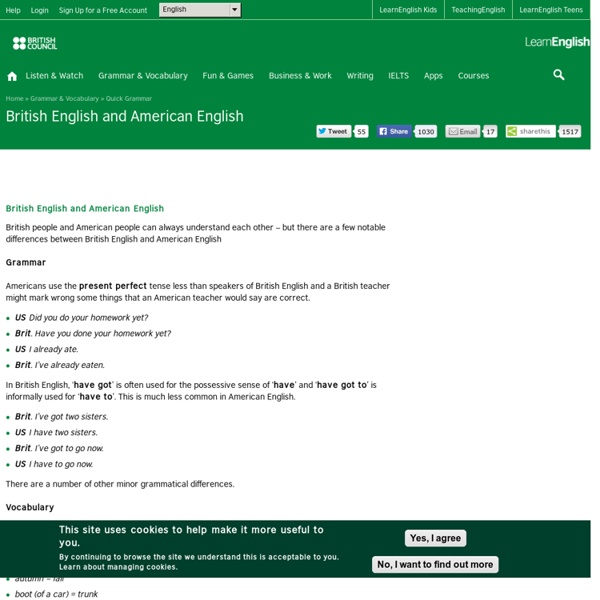American vs British pronunciation: 7 words to watch out for
Americans and Brits. There are some things that we have different words for (zucchini vs courgette, stroller vs pram), and some words we use for different things (always make sure you’ve agreed on a common meaning of pants before you broach the topic). Some words we spell differently – the pesky ‘u’ to remember to add or remove in color/colour , for instance – and then some are transatlantically fine on the page, but the moment you open your mouth… not so much. We’ve picked some of the most common words you’ll find pronounced differently across the pond, whichever side you’re looking at it. Niche Niche can rhyme with ‘itch’ in American English, though in Britain you’d only hear niche pronounced to rhyme with pastiche or quiche. Vase In British English, vase is pronounced to rhyme with Mars. Privacy While the US pronunciation of privacy is gaining currency in the UK, traditionally Brits have pronounced the first syllable ‘priv’ while Americans have pronounced it ‘prive’. Buoy Zebra Route Clique
British and American terms
British and American English often spell the same word differently, for example: labour/labor, enthrall/enthral, or centre/center. You can find out more about these differences here. There are also many cases in which the two varieties of English use different terms to describe the same thing. Here’s a list of various British words and expressions together with their American equivalents. Back to usage. You may also be interested in Shall or will? Commonly confused words Can or may?
A (very) rough guide to America from an Englishman in New York | Paul Owen
Scott Waters, an American, has caused a stir with a Facebook post sharing his observations from a recent trip to smalltown England. “People don’t seem to be afraid of their neighbours or the government” and “There are no guns” were two of his comments that seemed to help the post go viral. And pretty astute, I thought, was: “Pubs are not bars, they are community living rooms.” I moved from the UK to the US six months ago, and it’s true what they say: the portions are enormous; there really are 300-400 TV channels; everyone has beautifully white teeth; and nobody can pronounce “water”. But, at the risk of biting the hand that feeds me, here are a few other things I’ve noticed about the United States. 1. 2. 3. 4. 5. 6. 7. 8. 9. 10. 11. 12. 13. 14. 15. 16. 17. 18. 19. 20. 21. 22. 23. 24. 25. 26. 27. 28. 29. 30. 31. 32. 33. 34. 35. 36. 37. 38. 39. 40. 41. 42. 43. 44. 45. 46. 47. 48. 49. 50. • This article was corrected on 8 October.
Differences in American and British English grammar - article
By Kerry Maxwell and Lindsay Clandfield An article by Kerry Maxwell and Lindsay Clandfield on recognizing grammatical differences between American and British English. Introduction Speakers of American English generally use the present perfect tense (have/has + past participle) far less than speakers of British English. In spoken American English it is very common to use the simple past tense as an alternative in situations where the present perfect would usually have been used in British English. The two situations where this is especially likely are: (i) In sentences which talk about an action in the past that has an effect in the present: American English / British English Jenny feels ill. (ii) In sentences which contain the words already, just or yet: A: Are they going to the show tonight? 1. My team is winning. The other team are all sitting down. In American English collective nouns are always followed by a singular verb, so an American would usually say: Which team is losing? 2. 3. 4. 5.
Words Brits Use That Americans Stopped Using | Grammarly
A quick example of the bleeding obvious: people speak differently in the UK and the US. If you’re an American fan of British TV shows—the originals, not the American remakes—you’re probably very aware that once in a while, the characters will utter a word that you won’t hear on the streets of your hometown. But you may be surprised to know that some of the words we consider distinctly British today were once fairly common in the United States. 1 Tetchy, adjective Someone who is tetchy is someone with a bad temper: You can’t even talk with him these days; he’s just too . 2 Amongst, preposition While amongst is less favored than among in British English, it’s rarely seen at all in American English. There’s a grammar pedant us, and I intend to find out who he is. 3 Marvelous, adjective Sure, you can use amazing instead, but marvelous sounds so much more . . . marvelous: We had a time during that holiday retreat. We try to get together for a family meal once a . , that escalated quickly!
Differences Between American and British English
By Kenneth Beare While there are certainly many more varieties of English, American English and British English are the two varieties that are taught in most ESL/EFL programs. Generally, it is agreed that no one version is "correct" however, there are certainly preferences in use. The three major differences between between American and British English are: Pronunciation - differences in both vowel and consonants, as well as stress and intonation Vocabulary - differences in nouns and verbs, especially phrasal verb usage Spelling - differences are generally found in certain prefix and suffix forms The most important rule of thumb is to try to be consistent in your usage. Use of the Present Perfect continue reading below our video Loaded: 0% Progress: 0% In British English the present perfect is used to express an action that has occurred in the recent past that has an effect on the present moment. I've lost my key. In British English the above would be considered incorrect. British English:



